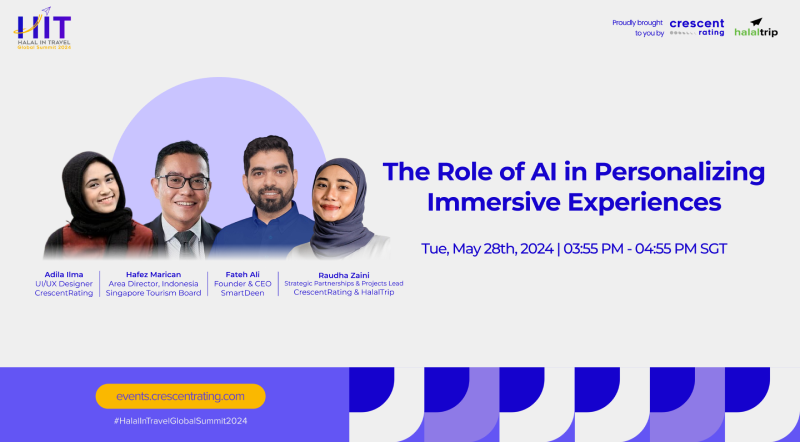
The Halal In Travel Global Summit 2024, hosted by CrescentRating in Singapore, brought together a panel of industry experts to explore the transformative potential of artificial intelligence (AI) in the travel sector. The session, "The Role of AI in Personalizing Immersive Experiences," moderated by Adila Ilma, UI/UX Designer at CrescentRating, delved into how AI is reshaping the landscape of travel personalization. The panel featured Raudha Zaini, Strategic Partnerships & Projects Lead at CrescentRating and HalalTrip; Fateh Ali, Founder & CEO of SmartDeen; and Hafez Marican, Indonesia Area Director at the Singapore Tourism Board.
Adila Ilma opened the discussion by highlighting AI's role in revolutionizing travel experiences. The panelists shared their perspectives on how AI technologies are enhancing personalization, creating more immersive experiences, and addressing data privacy concerns.
Raudha Zaini explained that AI is pivotal in HalalTrip’s approach to personalization. "AI tools guide businesses in creating and implementing innovative and sustainable strategies," she noted. At HalalTrip, AI is leveraged to offer personalized user experiences, predictive content delivery, and real-time analytics. By restructuring their app features to be more intuitive and responsive, HalalTrip aims to cater specifically to the needs of Muslim travelers, ensuring that every interaction is meaningful and relevant.
Fateh Ali expanded on this by discussing the innovative applications of AI. He emphasized that AI goes beyond simple recommendations; it creates deeply immersive experiences. For instance, AI-powered travel companion apps can generate personalized narratives and integrate with various services to anticipate user needs. This capability not only helps with language translation and restaurant suggestions but also tailors experiences based on user behavior and preferences, leading to a genuinely personalized travel experience.
Data privacy and security are crucial considerations in the deployment of AI technologies. Fateh Ali, as the CEO of SmartDeen, highlighted the importance of robust security measures. "Ensuring data security involves avoiding breaches, implementing clear opt-in and opt-out mechanisms, and mitigating biases in AI algorithms," he explained. His company focuses on building trust by maintaining a secure environment for user data and addressing vulnerabilities proactively.
Hafez Marican added to this by discussing the challenges faced in the Singapore Tourism Board’s initiatives. In developing a Bahasa-based AI itinerary planner for Singapore, the board must keep data such as information on Halal food and beverage outlets up-to-date. "Ethical data collection and compliance with data protection laws are essential," he noted. This ensures that the information provided by AI tools remains accurate and relevant, thereby building consumer trust.
The discussion also touched on how AI can enhance accessibility and inclusivity in travel. Raudha Zaini highlighted that AI's ability to analyze large data sets helps in creating personalized recommendations for Muslim travelers. By developing AI-powered chatbots that cater to specific needs and values, HalalTrip is working to ensure that travel experiences are both enjoyable and meaningful for Muslim travelers.
Fateh Ali noted that AI’s potential extends to creating inclusive experiences. "AI can cater to diverse needs, such as dietary preferences, and offer information in multiple languages," he said. This inclusivity can be particularly beneficial for small and medium-sized travel businesses, enabling them to provide unique insights and personalized experiences that larger companies might overlook.
Hafez Marican shared a similar sentiment, emphasizing the importance of training AI systems on comprehensive data to avoid biases. The Singapore Tourism Board’s AI initiatives aim to provide culturally relevant and accessible experiences for all travelers, ensuring that the technology supports a more inclusive travel environment.
As the session concluded, the panelists reflected on the future of AI in the travel industry. Fateh Ali predicted that AI will lead to hyper-personalization, democratizing information and allowing smaller businesses to reach broader audiences. "Ethical considerations are crucial," he warned, "to avoid biases and respect privacy."
Hafez Marican agreed, highlighting that AI will continue to make travel experiences more meaningful and enjoyable. He stressed the need for AI to be built on ethical foundations to ensure fairness and inclusivity.
Raudha Zaini concluded by emphasizing AI's revolutionary potential in travel. "AI can provide personalized and immersive experiences, but it's essential to use it responsibly, respecting privacy and ethical considerations," she said.
The panel's discussion at the Halal In Travel Global Summit 2024 underscored the significant impact AI is having on the travel industry. By harnessing AI's capabilities, the industry can deliver more personalized, secure, and inclusive experiences, ultimately enhancing the way travelers interact with the world
For more of Halal In Travel Global Summit 2024 sessions, please visit this page!